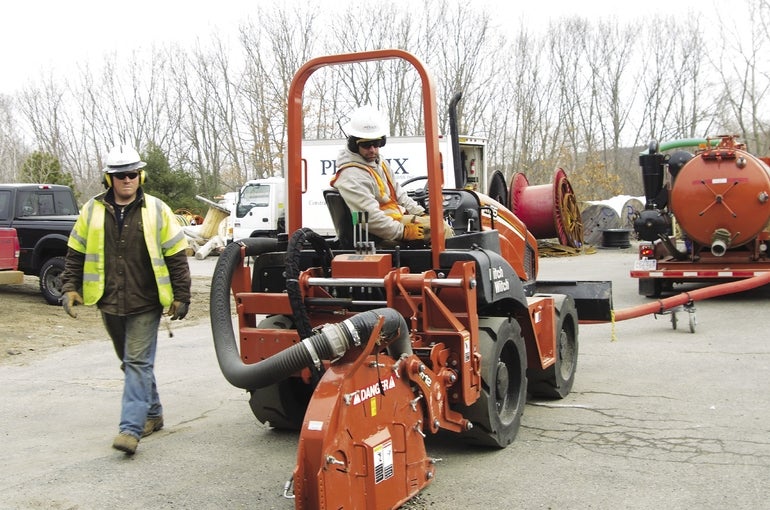The city of Worcester is in the process of completing an extension of its already vast data fiber network, with the goal of making it easier for businesses to access high-speed Internet connections.
An extension of the fiber network to more than 50 schools in the city is in progress, and a 1.2-mile construction of lines out to the airport is also underway, according to Lightower, the Boxborough fiber owner in charge of these projects.This extension of Worcester’s already vast fiber network is designed to lead to cheaper and faster Internet connectivity, which will help the city attract businesses in its target industries like technology and manufacturing. The Worcester Regional Chamber of Commerce commissioned a study last year to outline these benefits and is pushing city officials to take advantage of their head start in digital infrastructure.
“This is part of the economic development infrastructure, the same way roads and water and sewer and electricity are. Every business needs this,” said Timothy P. Murray, chamber president and CEO. “To the extent we can have fiber throughout the city, we can make the city more competitive.”
Much of Worcester’s already vast fiber network includes fiber loops laid in the area in the late 1990s by the company that is now Lightower, according to the chamber’s report, and one of the challenges going forward will be providing fast Internet at prices small businesses can handle.
The cost of the installation of these fiber networks is borne entirely by the companies that will operate them, like Lightower and Spectrum Business. The city of Worcester and other property owners simply partner with these providers to get the network infrastructure installed at these facilities. Lightower spends $600-$700 million annually updating its fiber networks while Spectrum spends $2 billion a year.
Fiber potential
The White House’s 2015 Community Based Broadband Report found Worcester is one of 495 cities and towns in the U.S. – and one of 10 in Massachusetts – with a broadband network in place, and the broadband here is fiber. Fiber is able to transmit data tens or even hundreds of times faster than DSL or cable, according to the Federal Communications Commission.
Businesses in Worcester can take advantage of both lit and dark fiber. Lit fiber is operated and maintained by an Internet provider like Spectrum Business, and dark fiber is maintained by the end user. If a business wants or needs to manage its network in-house using its own equipment, then dark fiber is the better option. Fiber provides great security and scalability, and large amounts of bandwidth, said Abigail McLaughlin of telecommunications consultant AJ Mayfair.
A small percentage of cities with broadband have fiber, and an even smaller percentage of those have dark fiber. Worcester is one of those towns.
Worcester has 10 data centers within 20 miles of the city. This means businesses can back up their data in a secure, nearby location, McLaughlin said. The city has 11 fiber providers, including companies who lease the fiber they own to others, like Lightower, and six long-haul providers, enabling state-to-state access.
Economic development impact
Since fiber offers unlimited speed and bandwidth potential, having it can be instrumental towards fostering economic growth, Murray said. A 2013 chamber report on Worcester’s economic competitiveness identified the professional, scientific and technical, education and health and manufacturing fields as the area’s fastest growing sectors, all of which need strong data connections. Worcester’s top 25 sites for development are within a mile of fiber.
A fiber broadband connection can be more expensive, and costs can vary depending on the provider, said Robert DeMaria, sales account manager at Spectrum Business, which owns more than 180 miles of fiber in the city and has 60 lit buildings. The cost can be a burden on small businesses, but so can not having access to fast and reliable Internet.
“You get what you’re paying for through fiber,” DeMaria said. “You can buy a Hyundai, and it’ll get you to and from work, or you can buy a Tesla, and it’s going to get you to and from work. They both do the same thing, but they have different qualities.”
While a DSL or cable connection could work for some businesses, any company whose operations would stall without the Internet should have fiber, said Chris Williams, vice president of complex solutions at Lightower, which has 80 miles of fiber in Worcester.
DeMaria is constantly getting calls from his people on the ground who notice construction, so Spectrum can get in and lay fibers before construction begins. Waiting until after the fact can be time-consuming and costly, he said.
To avoid this, Lightower will sometimes put fiber in for free, Williams said.
“We’re willing to take long returns on it for customers,” he said.
One of the ways providers hope to cut costs going forward is by installing new fiber lines through a method called micro-trenching. Instead of digging a four-foot-wide trench into the ground to accommodate a 12-inch cut for fiber lines, contractors like Phoenix Communications would only have to dig a little less than two inches wide and up to two feet deep. This knocks installation costs down by about 25 percent, said Mark Langevin, president of Phoenix Communications, a Shrewsbury firm contracted by Lightower to do the on-the-ground installations.
Though micro-trenching is cheaper and it is less disruptive to traffic because it doesn’t take as long, the shallower lines are harder to protect and more more susceptible to breakage, said Paul Moosey, commissioner of the Worcester Department of Public Works & Parks.
No fiber lines have yet been laid using micro-trenching, but the public works department is in the final stages of approving it, McLaughlin said.
To address issues like cost, the chamber is establishing a task force of vendors, city officials and business leaders. Murray said he hopes to have a fiber task force up and running in 2016.

